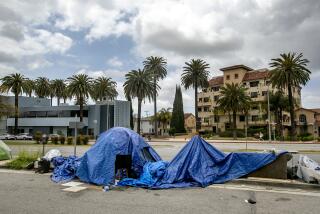Romanian Chess Master Plotted Flight to Freedom
- Share via
ESCONDIDO — There are several ironies at work in the life of 34-year-old Andre Hancu, whose teddy-bear veneer belies the years of calculation and risk that brought him to the United States.
The Romanian studied for years to become a chess master in his native country so he could ultimately travel--and escape communism’s oppression by defecting to the United States.
Today, he owns his own electronic components firm, which relies totally on government contracts to meet its payroll. But this time, it’s government intervention by his choice.
And today he doesn’t have much time for chess. Just as communism drove him to play the game so he could act out the most important move of his life, the demands of capitalism don’t leave him much time to continue playing the game.
Maybe there’s a made-for-TV movie in his story. Hancu, for one, thinks so.
The story would begin with Hancu, at 29, nervously standing atop a toilet in a public bathroom in downtown Vienna, Austria, the stall door locked and his feet off the ground so the government snitch can’t spot him. His anxiety would turn to relief with the sound of the train finally pulling out of the station, en route to Romania with every other chess player accounted for but Hancu, and with the security agent shrugging, sure that the loyal Hancu would simply catch the next train to Bucharest. Instead, Hancu would search out the refugee camp in Vienna, call his wife Sonia and, with the words, “I missed the train,” let her know that he had found his freedom, and hers would come next.
We then would flash back to November, 1951, in Brasov, Romania, where the infant Hancu is a postwar baby on the communist front, the second child of a middle-class mechanical engineer and his wife.
Father and grandfather played chess to pass the time, and young Andre would watch, first out of boredom and then out of interest. By the time he was 9, he was beating the two men at their own game.
We jump ahead to high school, with Andre playing soccer but, given his father’s encouragement, turning more seriously to chess. “Engineers’ sons play chess, not soccer,” Hancu’s father would intimate. In a couple of national youth chess tournaments, Andre the teen-ager would place second and fourth.
Now, it’s college: chess loses out to five years of intense study bringing Hancu a degree in mechanical engineering. He graduates in 1975 and gets a job as a design engineer at a factory with 20,000 other workers. He helps design parts for robotic assembly equipment which, in turn, will help make electronic gizmos.
But Hancu had no love for his country and wanted desperately “to live anywhere but there.”
Why? “The fear. It’s built up in your subconscious that you can’t speak certain things because the government will find out. You’re afraid to speak out, even to your friends. I made the decision that I would get out of the country, even if I had to leave everything behind.”
Twice during his college years Hancu tried to get a passport to leave the country, but was denied. “I had spoken up about a few things and they (the government) didn’t trust me to leave the country. One or two of the students I was with were security informants, and they told the government that I was not politically oriented, that I was not going along with the communist propaganda.”
Hancu wised up. He began talking the party line in public, but when pressed on joining the Communist Party, he successfully procrastinated. In 1977, after earning a master’s degree, the 26-year-old Hancu decided “to play chess and become a master, so I could travel--and defect. I gave myself five years to accomplish this.”
It was the logic of a chess player at work: first, develop an overall strategy, then work on the tactics--the specific moves to carry out the plan.
That same year he met Sonia, whom he would marry a year later. He shared his goal with her; she neither discouraged him or encouraged him. She probably just didn’t believe he could carry it off, Hancu reasoned later.
His chess mastery having cooled over the years, Hancu staged his comeback. In 1978, he played badly compared to contemporaries who had maintained their game over the years. “I wasn’t as good as I was in 1970,” he said. “So I played for hours every day, or I studied for hours. I studied openings and I studied strategies, and how plans are developed and accomplished. Many people can play 50 or 70 chess moves by memory, but if they don’t really understand the game . . . “
In 1979--the year Hancu’s wife bore her first son--his game was vastly improved and he almost won entry in the national chess finals in Romania. In 1980, he played one of the finest matches of his life, leading his chess club to victory in a small international tournament. The victory payoff went beyond chess: the club was invited to play in Spain. Finally, Hancu would have his chance to travel outside the country.
Hancu’s defection strategy was developing perfectly, and the moves were falling into place.
The traveling chess team included Hancu and seven other team players, and three others, who were assumed to be government informants: the team’s trainer (“let’s call him ‘Goltz,’ ” Hancu said), the club president and an undistinguished player from another team who had no particular reason for coming along other than to keep his eye open for defections.
The team flew to Spain and Hancu played well, but not great.
The mood on the return train ride to Romania was relaxed; the players spread out throughout the train, and in Paris, everyone was allowed to shop freely. Hancu figured he would have the same luck in Vienna, where he would shop on his own and simply not return to the train.
But, in Paris, one of the players nearly missed the train and the nervous trainer reacted by grouping everyone in two compartments. The government informants seemed on edge, and Hancu’s own anxiety increased. The night before the train pulled into Vienna, Hancu was afraid to sleep, fearful that he would talk in his sleep about his plan to escape.
A scheduled two-hour layover in Vienna on that particular Saturday afternoon was reduced to 45 minutes because the train was running late. But Hancu stuck to his plan, announcing that he wanted to get off the train and spend the last of his money in Vienna to buy more gifts for his wife and child.
He asked team trainer Goltz, the suspected informant, to accompany him on his final shopping excursion. “I feel ashamed for what I did--I befriended him over the course of two years so I could use him. And I did. But he was the best choice to accompany me into town, because they would suspect me less and because I would not be jeopardizing any other player,” Hancu said.
A sense of panic hit Hancu virtually the moment he stepped off the train and discovered that Vienna was a virtual ghost town, with Austria’s stores and businesses shut down for the weekend. “I couldn’t believe it--there was nobody on the street. I felt a shock but I decided, let’s go for it.”
With just about 15 minutes before the train was scheduled to pull out, Hancu and Goltz finally found some open candy and food shops; he asked Goltz to get in one line, so Hancu could get in another. But Hancu ditched Goltz and ran into a public bathroom. He picked out a stall, closed and locked the door, stood on the rim of the toilet and waited. “It was the longest 15 minutes of my life,” he said. “But when he didn’t see me, he assumed I had gone ahead and gotten on the train, so he got on the train too.”
As the train pulled out of Vienna, Hancu’s absence was discovered. Still, there was no great concern. “They said, ‘Oh, he missed the train, he’ll probably go to the (Romanian) embassy and catch the next train tomorrow.’ ” Hancu said, based on what others would tell him later.
Instead, Hancu called his wife, who understood his success when he told her of “missing” the train. He was so excited and nervous he could barely speak to her. Then, he was directed by police to the refugee camp. He had only a few dollars.
The next five months were spent at the camp, passing the time gardening and awaiting approval to get a visa to the United States. In Bucharest, authorities realized that Sonia was aware of the planned defection and punished her by giving her only menial tasks at a factory.
On Feb. 25, 1981, with American visa in hand, Hancu flew from Vienna to London to New York to Los Angeles--a 33-hour day that ended in the Irvine home of his American sponsor, a Romanian who had fled his country years earlier.
Hancu began learning English by reading books and watching his favorite television fare: Star Trek, Bewitched and John Wayne movies. He got a job as an engineering aide at a small Irvine company, then was hired by Canon Business Machines as a mechanical engineer.
On weekends he played chess--including in tournaments in San Marcos. And he decided he wanted to go into business for himself, so he found a part-time job in Escondido while doing mechanical engineering consulting work.
In May, 1982, with the help of U.S. Sens. Ted Kennedy, Charles Percy and Alan Cranston and Orange County’s U.S. Rep. Robert Badham, who applied pressure on the Romanian embassy in Washington, Sonia was released from Romania--in exchange for the deed to the couple’s apartment. Sonia, fluent in English, joined Hancu in Escondido, where today they rent an attractive condominium with their two young boys. “Romania did not want a scandal by trying to keep her,” he said.
Last year, Hancu formed his own modest electronic manufacturing and assembly plant, Automatic Integrated Systems in Rancho Bernardo, with four full-time employees. He is awaiting word this month on whether he will win a large government contract to build radio communication equipment for the military. If so, it will give his company economic stability, he says.
Hancu expects to become a naturalized American citizen later this year. He already is well versed on American business and government.
“The American government bureaucracy is terrible until you understand it and learn how to deal with it. But too many people give up before they learn how to work with it,” Hancu said. “In America I have discovered freedom--to starve to death if you don’t take care of yourself and work hard.”
But Hancu said he does not dwell on the hard times he has faced and may still face in this country as he carves out his own little piece of capitalism.
“You learn from what happens bad, and by always staying cool,” he said. “When I left Romania, I wanted to be free, and for my children to have freedom. I’ve taken my chances along the way.
“Now I want to become a millionaire in a few years. I may not get there but I will go in that direction. That is my strategy. I may go broke along the way, and if I do, I won’t make those same mistakes twice.
“I’m happy I’m free. I’m not looking back into the past as much as I am looking to what I still have to do for the future.”
More to Read
Sign up for Essential California
The most important California stories and recommendations in your inbox every morning.
You may occasionally receive promotional content from the Los Angeles Times.













